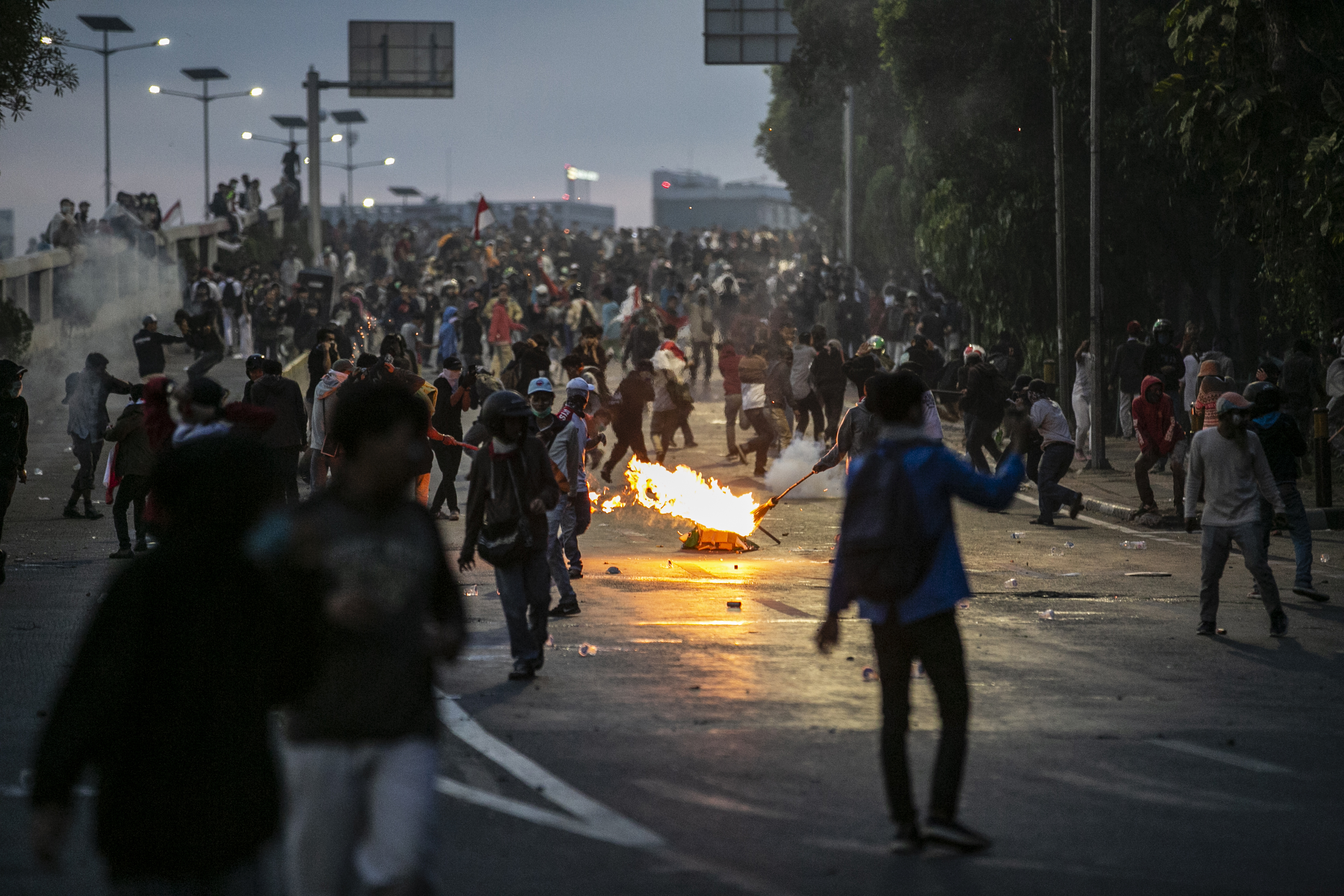Why are students protesting in Indonesia?
President Joko Widodo has tried to assuage protester's concerns amid increased violence, but their litany of grievances has grown.


A free daily email with the biggest news stories of the day – and the best features from TheWeek.com
You are now subscribed
Your newsletter sign-up was successful
Students and riot police have clashed across Indonesia, as protesters resisted a raft of new laws they said would make the country more repressive, and less transparent.
Police formed blockades on the roads leading to the parliament building in Jakarta yesterday, where reports stated that more than 20,000 police and military personnel were deployed to maintain order in the capital.
“Clashes between rock-throwing students and riot police broke out in the evening when police tried to disperse the protesters, ranging from high school to university students,” reports The Washington Post. “Protesters set fires to tires and pelted police with rocks, gasoline bombs and firecrackers near blocked streets. Riot police responded by firing tear gas and water cannons.”
The Week
Escape your echo chamber. Get the facts behind the news, plus analysis from multiple perspectives.

Sign up for The Week's Free Newsletters
From our morning news briefing to a weekly Good News Newsletter, get the best of The Week delivered directly to your inbox.
From our morning news briefing to a weekly Good News Newsletter, get the best of The Week delivered directly to your inbox.
Monday’s demonstrations were timed to coincide with the last day of parliament’s five-year session, as 560 members of the House of Representatives concluded their terms.
Last week, in response to the unrest, Indonesia’s president, Joko Widodo, known popularly as Jokowi, asked the country’s parliament to suspend the vote on the new criminal code. He refused, however, to issue a presidential decree reversing the legislation which sparked the demonstrations.
What is the new legislation causing the protests?
Last month, the Indonesian parliament passed legislation aimed at curtailing the power of the Corruption Eradication Commission, the body responsible for tackling graft in the country.
A free daily email with the biggest news stories of the day – and the best features from TheWeek.com
“Many Indonesians see government corruption as one of the nation’s biggest problems and view the commission as one of the few entities that has done something about it,” reports The New York Times. “At the same time, many members of Parliament, fearful of getting caught up in one of the commission’s investigations, have long wanted to limit its powers.”
Other new legislation in protesters’ crosshairs is the government’s planned overhaul of Indonesia’s criminal code. If passed, the new legislation would outlaw insulting the President, adultery and all sex outside of marriage. Framed by the legislators as measures to combat “social evil”, in effect the law also amounts to a criminalisation of all same-sex relations.
“The president said he would postpone it, but we want it cancelled,” said Rama, a 24-year-old student at Industrial Management Polytechnic, who gave only his first name for fear of retribution. “We will protest until it is revoked,” he said.
–––––––––––––––––––––––––––––––For a round-up of the most important stories from around the world - and a concise, refreshing and balanced take on the week’s news agenda - try The Week magazine. Get your first six issues free–––––––––––––––––––––––––––––––
What are the protesters’ other demands?
“It's not a one-issue protest,” explained Andreas Harsono of Human Rights Watch in Indonesia. “And it's also not a unified or organised movement.”
Many of the activists are acting in solidarity with the people of Papua, after the government increased its military presence in the province in response to mounting seperatist dissent.
“Amnesty International has called for an independent investigation in Papua after riots between protesters and the police this week led to at least 24 deaths and 733 arrests,” reports the Financial Times. “The latest demonstrations were triggered by allegations that a teacher had used a racial insult against an indigenous Papuan student.”
Demonstrators are also frustrated over government failure to contain forest fires currently raging across the country, as well as the practices of “slash-and-burn” farming and intensive palm-oil agriculture that are largely blamed for the increased rate of fires.
Government warnings
“Demonstrations that break laws, demonstrations that attack officers, damage and burn stuff, are not demonstrations anymore, but a movement by rioters,” said chief security minister Wiranto in a televised news conference.
His words were echoed by Widodo. “Our constitution guarantees freedom of expression, but the most important, do not be an anarchist who causes harm and violates the law,” he said.
Depsite the tough talk, the protests have place the president in an unwelcome position. “The revision of the law on corruption was the blunder that made the public very angry with him,” said Djayadi Hanan, executive director of the Indonesia Survey Institute, a polling group. “He has to start by winning back the public trust and the only way to do that is to repeal the law.”
Adding to the pressure facing Widodo is a slowing economy, exacerbated by the current unrest. “Investors have been worried that earnings will slump as growth in gross domestic product slows to 5.05%, the weakest in two years,” reports Bloomberg.
“The economic slowdown has been caused by a wait-and-see attitude among investors in the lead up to the cabinet formation,” said Harry Su, head of equity capital markets at Samuel International. “Continued demonstrations and skirmishes on the ground are adding to worries and contributed to the biggest net foreign outflow since June 2018.”
William Gritten is a London-born, New York-based strategist and writer focusing on politics and international affairs.
